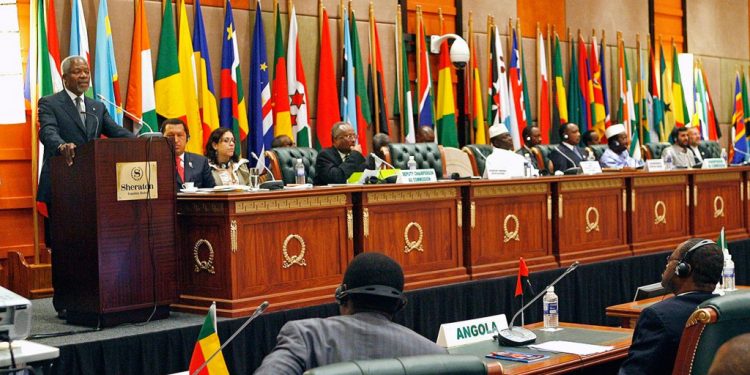To ensure the African Union (AU) remains relevant, its leaders must be judged on their ability to renew Africa’s fragmented multilateralism. The AU Commission is preparing for a leadership change, with candidates for the top eight positions to be announced on August 6.
After serving two terms as Chairperson, Moussa Faki Mahamat is ineligible to run again. His Deputy, Monique Nsanzabaganwa, is also ruled out due to the AU’s regional rotation system. Five other portfolios will see new leaders, while the current commissioner for Political Affairs, Peace and Security may be re-elected.
AU Commission Positions Up for Election in February 2025:
- AU Commission Chairperson
- AU Commission Deputy Chairperson
- Economic Development, Tourism, Trade, Industry, and Mining
- Agriculture, Rural Development, Blue Economy, and Sustainable Environment
- Infrastructure and Energy
- Education, Science, Technology, and Innovation
- Health, Humanitarian Affairs, and Social Development Current Commissioner Eligible for Re-election:
- Political Affairs, Peace, and Security
In line with the AU’s reform agenda, the February 2025 elections should focus on a competition of ideas. This period is crucial for evaluating the AU’s relevance. To prevent obsolescence, AU member states and Commission candidates should debate three main issues: the chairperson’s powers, the AU’s peacemaking capacity, and institutional reform.
Rumors and regional rivalries could derail necessary discussions, as seen in previous elections in 2016 and 2017. The AU has achieved significant milestones over the past decade, such as launching Agenda 2063, institutional reforms, the African Continental Free Trade Area, and joining the G20. However, the AU and African multilateralism need renewed vigor. Agenda 2063 lacks clarity on the type of inter-governmental organization Africa needs. The absence of standardized responses and accountability for coups and governance issues highlights the limitations of Africa’s collective security mechanisms.
Protracted conflicts (e.g., Somalia, South Sudan, and regions like the Sahel and Great Lakes) and new conflicts (e.g., Cameroon, Ethiopia, and Sudan) hinder the AU Peace and Security Council’s effectiveness. Except for Somalia, the AU has not been the first responder to any major conflicts this year.
The first critical issue is the AU Commission Chairperson’s powers. The chairperson’s prerogatives are often contested between member states and the commission. Despite the shift from a secretariat to a commission, member states still view the chairperson as a ‘first among equals’ rather than the head of the commission.
The current ambiguity regarding the chairperson’s authority compared to commissioners, and the ability to sanction non-delivery, favors member states by diluting the chairperson’s power. Faki faced pushback from member states, such as when he granted Israel observer status at the AU and managed Chad’s transition after President Idriss Déby Itno’s death in 2021.
Re-elected in 2021 with 50 out of 55 votes, Faki criticized the limitations imposed by member states. Nonetheless, the states continue to micro-manage the commission through the Permanent Representatives Committee (PRC), which oversees the AU’s daily operations and reports to the Executive Council.
Differences exist regarding the PRC’s role. While the commission views the PRC’s role as limited to liaising between AU organs and member states, African governments see it as a management tool to oversee the commission. Member states’ objections to non-consensual AU decisions lead to watered-down outcomes lacking clear direction.
The second issue is the commission’s crisis management ability. Previously, the focus was on funding peacekeeping operations, despite new conflict dynamics limiting this approach. The main problem is not funding but the AU’s capacity to design sustainable political solutions to conflicts. Even if fully funded, the AU would likely struggle with Africa’s various conflicts under its current model.
This raises the question of whether the AU’s current model is suited for managing and preventing crises. Despite a sophisticated peace and security architecture, the AU’s conflict response is often reactive and requires ongoing, structured engagement. Inefficient use of Special Envoys and High Representatives indicates poor conflict prevention, exacerbated by insufficient human and financial resources.
Lastly, the AU’s institutional reform blind spots and gaps must be addressed. The reforms have not significantly improved the AU’s ability to handle security crises. The conflict early warning system’s disappearance and the merger of the Political Affairs and Peace and Security commissions lacked adequate policy support. Consequently, the merged commission is more a superposition than an integration of the two previous departments.
The initial rationale for AU reform was cost-saving, not improving effectiveness or impact. The AU is a small organization with vast objectives. The reforms have not tackled member states’ control over the commission, limiting its autonomy and performance. This explains why institutional reform has yielded few results.
Aspiring AU commissioners must present innovative ideas for these and other key issues. While heads of state and government will elect the new commissioners in 2025, failing to address these problems could lead to the gradual disintegration of African multilateralism into ad hoc mini-lateralism.
As global competition intensifies and development assistance declines, the AU’s strategic weight will depend on its commission’s ability to deliver despite its limitations. If not, the AU risks becoming irrelevant, much like its predecessor, the Organisation of African Unity, in the late 1990s. It








